SBC
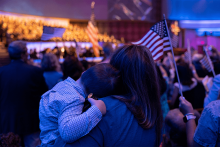
The Southern Baptist Convention, the largest Protestant denomination in the U.S., on Wednesday voted to condemn the use of in vitro fertilization, signaling the campaign by evangelicals against abortion is widening to include the popular fertility treatment.

AFTER THE SOUTHERN Baptist Convention announced that women cannot be pastors, Sunday mornings have taken a new form across the nation. People are seeing the potential of an uninterrupted two-day weekend for the first time and relishing the freedom.
In clarifying its stand on women in leadership — that Baptists won’t stand for it — the SBC suddenly confirmed what groggy teenagers have been telling their parents for generations — namely, that sleeping in might be a better idea than attending a church where females are only needed for child care and potlucks.
In fairness, when the SBC committee — composed almost entirely of men — made the recommendation, it was mainly to free up parking. The SBC is the largest Protestant denomination in the country (high five!), and what better way to open more spaces than by telling half of humanity they’re not appreciated?
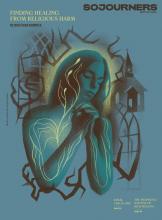
Healing from religious harm: Why compassionate community is part of the journey.

“GRIEF TAKES SO much energy. I can feel it even in my fingers.”
These are the words that drew me to Christian author and speaker Beth Moore’s memoir, All My Knotted-Up Life. She posted the sentences as two separate tweets in the wake of her brother’s unexpected death, less than three weeks before her memoir’s release.
Through her Living Proof Ministries, Moore is one of the most prominent white evangelical women in the U.S. I braced myself as I entered the book, but she delivers stories of resilience with all the charm, sweetness, and humor one would expect from a memoirist with roots in Arkadelphia, Arkansas.

The Southern Baptist Convention, the largest U.S. Protestant denomination, said on Friday that several of its entities were being investigated by the U.S. Department of Justice, after a report found the church had mishandled sex abuse claims and mistreated victims.

THE SOUTHERN BAPTIST CONVENTION has long been a bellwether for conservative politics. At its annual gathering, controversial resolutions often forecast the upcoming battles of our nation’s culture wars. For too many in the denomination, soul competency has given way to partisan loyalty. This transformation began in 1979 when Paul Pressler and Paige Patterson launched an unprecedented, highly orchestrated campaign to persuade members to vote for a fundamentalist SBC president, who then began a cascade of fundamentalist appointments at every level of the denomination. Being “moderate” on abortion, gender roles, and gay rights, among other issues, became deal breakers. Those who found themselves on the outs with fundamentalist extremists were, as they have described, exiled.
Gendered hierarchies are fertile ground for sexual abuse, and in 2018 Patterson was fired as president of Southwestern Baptist Theological Seminary for mishandling sexual assault investigations. The toppling of this fundamentalist leader reverberated through the SBC, and a growing chorus of voices, most notably former member Beth Moore, called on the denomination to address this issue as well as restrictions placed on women in ministry. And the politicization of critical race theory, which David Theo Goldberg of the Boston Review called the “weaponization of colorblindness,” also perched high on the SBC agenda. Both issues figured prominently in the choice of a new SBC president this spring.
Candidate Ed Litton of Alabama conceded that there should be conversations about structural racism and investigations into the denomination’s handling of sexual abuse, while Mike Stone of Georgia doubled down on the fundamentalist position championed for years by Patterson and his acolytes. Thus, the 2021 election of the SBC president was seen as a referendum not only on these issues, but also on the Trumpian politics of political extremism and absolutism that underscore them. Stone took an early lead in the voting, which signaled to many observers that the bond between the SBC and Trump’s Republican Party would prove unbreakable. Moderates breathed a sigh of relief when Litton emerged as the winner; headlines noted that the SBC had pushed back against the denomination’s version of Trump extremism.

I REMEMBER HER green dress. She stood in center stage, shoulders barely clearing the pulpit. She was preaching, except the Southern Baptist Church didn’t call it preaching. As a missionary returning from two years in Jordan in the mid-1980s, Martha Bumpas was giving her “testimony.”
Bumpas was, I think, the first woman I heard speak from the pulpit. She sounded so full of hope. As her friendship with my family deepened, God’s calling on her life deepened too. She began to pursue a calling into full-time ministry.
Her timing proved poor. In 1988, Dorothy Patterson delivered a paper at the annual meeting of what was then the Southern Baptist Historical Association that articulated a “biblical theology of women’s submission to men’s authority,” as historian Elizabeth H. Flowers tells it. Patterson’s sharp wit—despite her historically inaccurate argument—won the Southern Baptist day. Ten years later she won again, this time on the floor of the Southern Baptist Convention (SBC) annual meeting as she fought for the inclusion of language on women’s “gracious submission” in the Baptist Faith and Message, the repository of doctrine for Southern Baptists. Patterson succeeded in narrowing options for SBC women like Bumpas: Baptist seminaries deterred women from master of divinity degrees and, by 2000, pushed them out of preaching classes. Only men were deemed biblically fit to serve as pastors.

I knew there were Christian slaveholders, Christian Nazis, and Christians who opposed the civil rights movement, but in my mind, these people were “Christians” — with scare quotes. These so-called Christians, I imagined, were either conscious hypocrites, using the guise of Christianity to seize and maintain power, or mindless followers of the status quo who never devoted real attention to prayer and scripture.

At a recent annual meeting, seminary presidents in the Southern Baptist Convention doubled down on the SBC’s dismissal of “critical race theory,” which examines the issues of embedded racism across institutions and culture in American society. CRT shows how white supremacy — the belief that some people are more valuable than other people because of their skin color — is not just a personal prejudice but a structural and societal practice in America.

For over a decade, activists have pushed for the creation of a database in the Southern Baptist Convention that would list credibly accused predators. They argue that, using such a database, a church’s hiring committee could check candidates against the list, thus preventing some of the shuffling of predators that the SBC and other denominations have seen. The SBC has yet to adopt the idea, however, arguing they can’t exercise authority over local, autonomous churches and make them report abuse. Survivors and activists , however, say that shouldn’t stop the SBC from trying.

As thankful as I am to see Greear speaking clearly and mournfully about sexual abuse in the SBC, I feel concerned by this praise-swirled-with-certainty-of-divine-intervention. It seems to surpass encouragement and land at a premature rendering of Greear as a hero. I fear that too many are equating words of sorrow over sexual abuse with a proportionate, justice-oriented response.
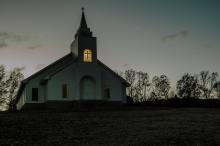
The announcement follows a stunning report on hundreds of sexual abuse and misconduct cases in the Southern Baptist Church.

Vice President Mike Pence touted President Trump’s meeting with North Korean President Kim Jong Un in a speech before Southern Baptists and urged their continuing prayers as the administration moves ahead with negotiations to seek peace on the Korean Peninsula.

“The reason for this action involved the church’s un-Christian attitudes and acts toward another associational church. These attitudes and acts were racially-motivated,” the association said in an April 4 statement. “Thus they do not reflect the values and mission of the Mallary Baptist Association.”

“This news will, we understand, bring great sorrow,” Rummage said. “I have shared with the Executive Committee officers what Dr. Page shared with me, including Dr. Page’s repentance and deep regret that his actions have caused pain for others.”
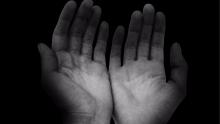
For years, the American evangelical church and many of its denominations have used the Bible as a way to control, oppress, and abuse others — from cultural genocide to the abstinence/purity movement. In my church, which was part of the Southern Baptist Church, I grew up learning that to love God meant to get my checklist in order and to use that checklist to secure the salvation of everyone I came in contact with.

The theology, sociology, and politics of race continue to play themselves out in America in matters of both church and state. That racism is a sin and a gospel issue — and not just a political matter for us as Christians — was asserted once more yesterday. The continuing struggle to put our theology over our sociology among white Christians was again on display.
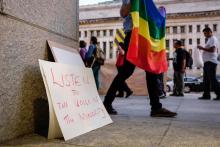
“I just wish we could have had more conversation before funds got dropped from 20-plus backing churches and organizations,” Hale told Sojourners. “Rather than the conversation, we went straight to protocol. And that’s a sad reality of the way big business and denomination operates.”
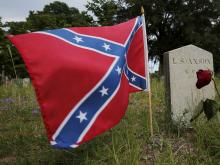
The Southern Baptist Convention, born in 1845 in a split over its support for slavery, passed a resolution calling for Christians to quit using the Confederate flag.
“We call our brothers and sisters in Christ to discontinue the display of the Confederate battle flag as a sign of solidarity of the whole Body of Christ, including our African-American brothers and sisters,” reads the resolution adopted Tuesday at the convention’s annual meeting in St. Louis.
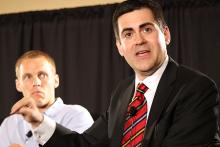
In the wake of tragic shootings of unarmed black men at the hands of vigilantes and white police officers, many institutions across American society, from the president on down, have sought to foster “national conversations” about race.
Perhaps surprisingly, an agency of the Southern Baptist Convention is sponsoring one of the most important and fruitful such conversations. The SBC’s public policy arm, the Ethics & Religious Liberty Commission, has hosted a summit on racial reconciliation last week in Nashville, Tenn.
Founded in 1845 in a split over slavery, the SBC has made laudable efforts to overcome its racist past. Some moderate and liberal Southern Baptist leaders prophetically denounced racism and supported the civil rights movement, but those very leaders were forced out of the denomination during a period of conservative resurgence in the 1980s. Today’s SBC leaders are in the tenuous position of saying that moderates were right about race but wrong about everything else.
Southern Baptist leaders are determined to challenge the lingering indifferent or crude attitudes on race where they still exist among the denomination’s mostly white, mostly Southern constituency.
Charged with carrying out the SBC’s political priorities, the ERLC is best known for its advocacy for religious freedom and against abortion and same-sex marriage. Yet in the wake of unrest over last year’s deaths of Michael Brown in Ferguson, Mo., and Eric Garner in Staten Island, N.Y., the ERLC hastened its plans to hold a summit on race.
The Nashville event drew more than 500 clergy, lay leaders, and seminarians from across Southern Baptist life. Thousands more watched a live stream online. The speaker lineup was male-dominated but was decidedly mixed race. The ERLC was much more eager to hear from ethnic minorities at this summit than it was to hear from gay people at its fall conference on homosexuality.
While the sexuality conference projected certainty and unanimity — acceptance of homosexual expression is inconsistent with Christianity and will not be tolerated in Southern Baptist churches — white Baptists came to their race summit with genuine humility and a spirit of repentance for the harm racism has caused.
Dean Inserra, lead pastor of City Church in Tallahassee, Fla., challenged the audience: “When you say a school or neighborhood has ‘gone downhill,’ what are you saying?”
Conceding his own need for greater empathy, Inserra recalled asking a black clergy colleague to help him understand how police violence affects black communities.